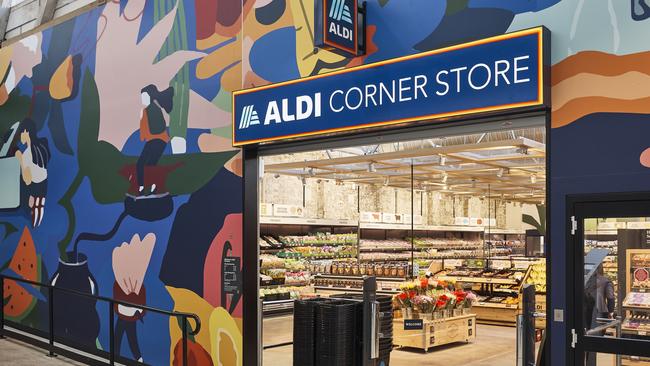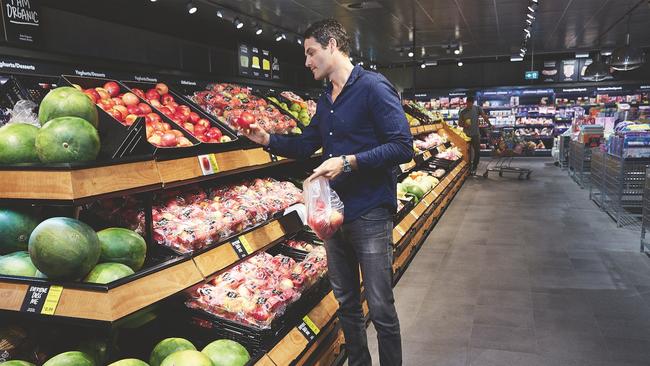Aldi believes it has secured market share from its rival supermarkets
Germany’s Aldi has been here for more than 20 years and it’s now confident it has increased its market share at the expense of Woolies and Coles.

German discount supermarket Aldi says it is winning market share within the highly competitive $100bn-plus supermarket sector as consumers seek savings to combat mortgage bills, rent, double-digit food inflation and other cost-of-living expenses.
Aldi boss of national buying Jordan Lack told The Australian that over the past year Aldi’s 580 stores had clawed 1 per cent market share from other supermarkets – much of which likely came from heavyweights Woolworths and Coles.
He said data collected by PwC showed more customers were shopping at Aldi stores more often in the past quarter of 2022, up 4.2 per cent year on year, and were delivering a gain in total market share in the same time frame.
Customers were seeking savings had driven consumers to Aldi’s broad, and sometimes quirky, range of private label groceries which were becoming well known to Australians after 20 years of being in the Australian market.
“I think our growth that we are seeing over the last 12 months is probably the greatest testament to that. We are seeing more shoppers, shoppers are coming back and spending more with us on every occasion. Loyal shoppers are spending more with us,” Mr Lack said.
“So people are really gravitating towards us as they seek out value and that is testament to the savings that demonstrates that customers are seeking that out and it really resonates with them. “And that is in line with what we were hearing and seeing.”
Aldi has released its latest savings report, analysed by consulting firm PwC, that argues Australians are filling their trolleys at Aldi and sharing in $3.1bn in annual savings.
Aldi claims that since it entered the market in Australia 22 years ago it has saved Australian households a total of $7.8bn.
“We recognise the great responsibility we have to our shoppers and the broader community when they’re feeling the pinch from the rising cost of living,” Mr Lack said.
“Our price promise remains the same from the day we opened our first store over 20 years ago – we won’t be beaten on the cost of your weekly shop.”

According to the report Aldi experienced significant sales growth in the last quarter of 2022, up 13.2 per cent year on year.
These sales growth metrics have been driven by changing customer behaviour, of which customers switching some or all of their spend to Aldi from other retailers accounted for 73 per cent of that growth.
Existing Aldi shoppers increasing their spend equated to 25 per cent of growth and customers shopping at Aldi for the first time, accounted for 2 per cent of growth.
This growth at Aldi has been driven too by many consumers choosing Aldi over Woolworths and Coles.
“Old habits die hard. There is obviously a degree of cross shopping which happens, but what we’re seeing now is that instead of people having one of the others (supermarkets) as their regular supermarket, we are seeing customers shopping at us first and that’s a big, important thing for us,” Mr Lack said.
“We have seen a shift in customer purchasing behaviour.
“Existing customers are shopping with us more frequently, and an increasing number of Australians are looking to Aldi for their grocery needs.
“We have seen increases in what we call the ‘centre of the plate’ – or proteins and vegetables – as Australians try to reduce pressure on their household budget without compromising on the quality of the family meal.”
Aldi has always had a strong private label or “own brand” range, and this dominates its stores where the majority of food and groceries it sells are Aldi-owned brands.
In the current tougher economic climate private label products, which are traditionally cheaper than branded groceries, are becoming increasingly popular. Both Woolworths and Coles have witnessed strong demand for their own private-label products.
“A lot of people are now growing up with the brands that we have despite them being exclusive to us,” Mr Lack said.
“We’ve got generations now which are growing up with those Aldi brands in their household and something that they see as a brand.
“From a market perspective I think there is a switch towards private label as customers are trading down, but we see it quite differently.
“Instead of trading down into private label products at competitors, you can actually switch to Aldi, save more money and have a really, really good quality product with an exclusive brand.”




To join the conversation, please log in. Don't have an account? Register
Join the conversation, you are commenting as Logout